- Home
- Lois Lowry
Rabble Starkey Page 7
Rabble Starkey Read online
Page 7
"Millie," he said in a gentle, sort of joking voice, all reassuring, "I do believe you must have nine lives, like a cat." He put his arm under her shoulders and helped her to sit up.
She squinted around. "Where are my glasses?" she asked.
Gunther reached over to the table and handed them to her. "They're kinda busted," he said, sadly.
The glass wasn't broken, but the gold frame was all bent on one side. She tried to put them on, but you could tell it hurt when she touched her face, and finally she just held the glasses in her lap.
"Well," she said crossly, "how do you expect me to see anything?"
Mr. Bigelow took the glasses and pried at the bent part until he straightened it some. Then, real careful, trying not to touch the swollen-up place, he put them onto her. She blinked and looked around the room. "What was it broke?" she asked loudly. "I heard something break."
I ran to the hall by the front door and picked up the handle that was lying there in the pieces of broken glass. I took it back to her. "It's sharp at the end," I said, trying to be helpful. "Be careful."
Sitting up, Millie Bellows had been trying to get herself in order and to look dignified, but when she took that handle from me, and peered at it through her bent glasses, her face just sort of fell apart. She started to cry. "My mother's wedding-gift pitcher," she said. "It sat there upon that hall table all my life!" She turned the handle over and over in her hands.
"Me and Veronica'll try to mend it for you," I told her. "We'll use Elmer's glue." I knew we couldn't, but I thought it might make her stop crying if I said that.
Mr. Bigelow hugged her tight around the shoulders. "Millie," he said, "I have the car outside. And I'm going to run you over to the hospital so they can take an X ray. You look just fine to me, but we want to be sure."
She looked all confused, but she gave the handle back to me and swung her legs down to the floor. "Here," I said. "I have your slippers here." I knelt down to put them back on her feet.
But she kicked at me like a little child having a tantrum. "Shoes!" she ordered, frowning. "Get me my shoes."
Veronica found her Sunday shoes in the bedroom closet, and when Millie had them on, she stood up, leaning on Mr. Bigelow's arm.
"You girls take Gunther home, and tell Sweet-Ho not to worry," Mr. Bigelow told us.
So we did that, collecting our dumb old trick-or-treat bags from the porch as we went. Gunther yawned and shivered all the way home, and we didn't talk much. Halloween was ruined.
Back home, while Sweet-Ho was putting Gunther to bed, me and Veronica examined the black hat that I had wadded up inside my shawl. It was just like a little beanie, and inside on the lining was printed: SENIOR CHOIR. FIRST PRESBYTERIAN CHURCH.
That didn't surprise us none.
9
Millie Bellows had to stay in the hospital overnight—for observation, they said. It made Veronica and me laugh, thinking of Millie Bellows being observed. Shoot, she was always the one that did the observing of everything, from her porch chair. I wondered if she was an old crosspatch at the hospital, complaining about the nurses and the food and who-knows-what-all.
Mr. Bigelow picked her up in his car and took her back home the next morning. After school, Sweet-Ho asked us to take over a casserole and some brownies.
"We ought to take the Elmer's glue, too," Veronica said, "and try to glue her broken pitcher."
So I put the little white bottle of glue in my pocket and we kicked through the leaves over to Millie Bellows's house, me with a shoe box full of Sweet-Ho's brownies and Veronica carrying the Bigelows' big blue casserole dish filled with beef stew.
Millie Bellows knew we was coming because Sweet-Ho had called her on the phone, so we just knocked loud and went in. She was lying on the couch again, but with her glasses on; she was watching TV. Dumb old Wheel of Fortune, with Vanna White wearing indecent clothes and giving away diamond earrings and such to people who always say hello to their children back in Indiana.
"We're sorry for your trouble, Mrs. Bellows," Veronica said. "I'll just put this stew into your oven, and then it'll be hot at dinnertime. Would you like a brownie? And I could make you a cup of tea."
Millie Bellows gave a little snort, which Veronica took as yes. I sat down on a chair near the couch while Veronica went to the kitchen.
"Are you feeling better?" I asked politely. I could see that her eye was black. Actually, it was more purple than black.
"Shhh," Millie Bellows said, watching the TV. Somebody had just hit a BANKRUPT and was trying to look like a good sport about it.
Well, if a person don't want to converse politely, you can't force them. So I just watched with her while a man wearing a nametag that said DON bought some vowels and then guessed the phrase: "It never rains but it pours." He got to choose three thousand dollars worth of stuff from the game room, so he took a pool table and some water skis, and Vanna White pretended to be all delighted.
"It never rains but it pours" made me think of the busted pitcher, and I peered around to see if I could spot the pieces of glass. Mr. Bigelow had told us that he cleaned it all up after he got back from taking Millie to the hospital. I couldn't see it anyplace, and I sort of hoped he had thrown it away, because I knew that the Elmer's glue wouldn't work.
Finally Veronica came in with a tray full of tea things. Wheel of Fortune was just ending; Don didn't win the Volkswagen Cabriolet because he chose the wrong letters, so Vanna looked despondent, pouting, while the audience clapped, and then a commercial started.
"Did you bring sugar? I need sugar," Millie Bellows said. I got up and turned the TV off.
Veronica stirred some sugar into a cup of tea and handed it to Millie, who grunted and eased herself up into a sitting position on the couch.
We all sipped at tea without saying nothing, and then suddenly Millie Bellows burst out, "Why was your brother dressed in that ridiculous fashion?"
Veronica started to laugh. "That was his Halloween costume, Mrs. Bellows. He was supposed to be a ballerina. It was my old costume from a dance recital. We were trick-or-treating. That's why we rang your bell last night."
"Well, all that foolishness got me this eye, I hope you know that, and my head pained so I couldn't sleep all night. Lord knows what my hospital bill will be."
Mr. Bigelow had already told us that her hospital bill would be nothing because of her insurance and Medicare. But we didn't say nothing. She just needed to fume and fuss, I guess, so I can't fault her none.
"If you hadn't pushed at my doorbell in that demanding way, I would never have opened my door in that terrible wind," Millie Bellows muttered.
Terrible wind? There wasn't no more than a regular evening breeze the night before. But I kept silent, and so did Veronica.
"You ought never to open your door in a terrible wind," Millie went on, "for the very reason that something might blow in and do damage, as it did. Time you learned that."
We nodded and sipped at our tea. So she thought that the wind had blown something in and given her a black eye. Some wind that would be, to pick up a stone and hurl it. Some wind, wearing a black choir robe and hat from the Presbyterian church. But I didn't say nothing.
Millie Bellows stuffed half a brownie into her mouth and then just kept talking angrily, crumbs flying. "This eye will heal," she said. "But my mother's wedding-gift pitcher, now that is an absolute loss. My mother was married in 1890, and that pitcher was a gift from Mr. and Mrs. Leland Norton. Mr. Norton once owned the Highriver Coal Company, but of course you wouldn't care about that."
"Mrs. Bellows," I said, "we brought the Elmer's glue along with us, so's we could try to mend your pitcher." I took the glue out of my pocket and showed her.
"I know it's in a lot of pieces," Veronica told her, "but Rabble and I can work at it, and maybe—"
Millie Bellows squinted over at me. "Just what kind of name is that, anyway?"
"Elmer's," I said. "It's just a name for glue."
"Your name is what I mea
n."
"My name? Rabble? Well, that's short for Parable, Mrs. Bellows. It's a Bible name."
She grabbed up another brownie. "A Bible name is Ruth," she said. "Or Rebecca. Now those are good Bible names. I don't know what your mother was thinking of, to give you a name like that."
Of course it wasn't my mother at all who gave me my name. It was Gnomie. But I didn't see that it was any of Millie Bellows's beeswax. And shoot, I can't see as how Millie is such a wonderful name. Or that it was good manners to be shoving brownies into your mouth that way, and talking while they was still there, not even chewed. I thought all of that, but I didn't say nothing.
"Mr. and Mrs. Leland Norton lived in that big yellow house up on High Street," she was saying. "The one that's a funeral parlor now. In the old days it was the most elegant house in Highriver. When my mother was married in 1890, the reception was held at the Riverfront Hotel, which no longer exists, and the guest list numbered in the hundreds. They served chicken a la king in patty shells. Somewhere here I have the news clipping from the wedding."
She began to peer around the room. There was stuff everywhere: books and magazines and old photograph albums, all of it somewhat haphazard on top of unmatched tables and chairs. Old lamps was everyplace, and vases, and framed photographs of people from the old days: ladies with their hair all swept up, and men looking stern, with pointed mustaches.
"I believe I won't look for it today," she announced suddenly, and lay back down. "See that you wash up these cups."
Veronica picked up the tray. "And shall we try to glue the pitcher for you?" she asked.
Millie Bellows waved her hand in the air and shook her head. Her eyes was closed. "It's ruined," she said. "Just clean up and then go home."
So we did.
When Sweet-Ho came to bed that night I was still awake, reading. I watched while she put her nightgown on and began to brush her hair.
"You're so pretty, Sweet-Ho," I said to her. "I believe you're as pretty as a movie star."
It was true. Her hair was long and thick, and it curled at the ends. She was wearing a blue flannel nightgown that matched her eyes, and it had a high neck with lace around the edge, so that she looked old-fashioned like the ladies in Millie Bellows's photographs, but softer and sweeter, not nervous and serious like the photograph people.
Our room at the Bigelows' house was pretty, too. It had pale yellow wallpaper the color of a winter sunset, with tiny pink flowers scattered about. We hadn't put up any of our old wall stuff from the garage, because Sweet-Ho said that thumbtacks or tape would mess the walls. But there was a little picture hanging between the beds, a watercolor of a garden, and it made me think of Gnomie's garden back at Collyer's Run, full of pink roses and tall blue delphiniums. Back before Gnomie got sick, she used to tend her flowers every day in summer, talking to them, telling them to stand up straight and proud.
"Millie Bellows really liked your brownies," I said, "but her manners is atrocious. She gobbled, and talked with her mouth full."
"She's old, that's all."
"Old doesn't excuse rude."
Sweet-Ho got into her bed and sat with her knees up and her chin resting in her hands. "She's lonely, too, I expect. If you live alone, you forget about the need to make other people feel comfortable. And that's all that good manners is: making other people feel comfortable."
I never thought about that before. But Sweet-Ho was right, I decided. Please and thank you and excuse me and not talking with your mouth full and all that, it's for the other person. And Millie Bellows, she didn't care none about me and Veronica.
"I'm going to try to remember that all my life," I told Sweet-Ho, "even if I get to be a hundred. But I don't expect I'll ever be alone, because I plan to have a lot of children."
"Good. I'll be a grandma."
"Sure. You can live with us and bake cookies and help tend the babies."
Sweet-Ho chuckled sleepily. She lay down and hugged her pillow. "You won't make me do the ironing, will you?"
I thought that over while I marked my place in my book and put it on the table beside the bed. "No," I decided, and turned the light out. "You won't have to do anything you don't want. You can be lazy, if you like."
"Indolent," Sweet-Ho said, yawning. "I'll be indolent when I'm old."
Shoot, Sweet-Ho always had me beat in words. Even now, with my thesaurus.
10
Fall continued on and began to turn into the beginning of winter, the way it does. Halloween pumpkins that had been standing on people's steps and porches turned rotten and their faces caved in like the faces of old people, squinched and wrinkled. Sometimes in the mornings, walking to school, Veronica and me could blow steam out of our mouths, and we pretended to be horses, snorting and prancing about.
We fell into the habit, afternoons after school, of stopping by Millie Bellows's house. We didn't do it because we wanted to. We did it for Sweet-Ho and for Mr. Bigelow, who asked us to, and only after we argued a bit.
"She's too old to be all alone all the time," Sweet-Ho had said. "She just needs someone to check and see she's okay."
"You could call her on the phone," I pointed out.
"Of course I could call her on the phone. But I'd feel better if someone looked in and saw her regular. And I can't always do that, with Gunther to tend and all."
"Just a hello would be enough," Mr. Bigelow said.
"A cheerful hello," Sweet-Ho added, glaring at me.
Veronica and me made faces at each other. But we did it, each day on our way home from school. At first we just looked in and said hello—a cheerful hello. But before long we was actually going inside, making her some tea, helping her a bit about the house. Millie Bellows grumbled and fretted, complaining that we was always hanging about and in the way. Shoot, I couldn't fault her none for that; nobody wants people always poking their noses in your business. But there was always something that needed doing: one day a light bulb to be changed in a place she couldn't reach without standing on a chair—and she wasn't too steady on her feet, so it would have been downright risky for her; another afternoon, her kitchen sink all clogged up so that we fixed it with the plunger, something she wasn't strong enough to do. Most days it was just her few dishes in the sink, or some little bits of laundry. We noticed that if we didn't do those things, she ate off the same dishes again without washing them, and wore the same clothes too long without changing.
She never thanked us, not once. She only sat in the front room watching her dumb old TV shows, and if we got to laughing in the kitchen she called out that we was too noisy. But after we finished the chores and made tea, she would turn off the set, get out her old photograph albums, and show us the pictures while we sat with her.
At first we only looked to be polite. But after a while, after she showed us the same pictures again and again, it got so's we felt we knew all those people with their high, stiff collars in the faded photographs. We got to wheedling her into telling us stories to go with the names.
"What was your brother Howard like when we was little?" Veronica asked. We was passing around Howard, in a picture where he was little and wearing an old-fashioned sailor suit with long white stockings, his hair down to his shoulders like a girl.
"Remember when we dressed up Gunther like a ballerina, he tried to act all graceful and pretty? When your mama dressed Howard up with long curls and stockings, did he act that way?" I asked.
"Good heavens, no," Millie Bellows said, and took the photograph back to peer at Howard. "He was all cleaned up to have this picture taken. But most times he was just as dirty and noisy and dreadful as that Cox boy."
Veronica and me didn't look at each other, but I know we was both thinking the same thing when Millie Bellows mentioned Norman Cox. Back at the house, we still had the black choir cap hidden in a drawer under Veronica's summer clothes. We hadn't decided what to do with it. We hadn't even told Sweet-Ho or Mr. Bigelow about it, not even after Halloween when they was still wondering and speculatin
g about who could've thrown the stone.
"Tell us something dreadful that Howard did," I said. In the picture he looked so clean and sweet, about Gunther's age and ten times handsomer.
"Here he is, older," Millie Bellows said, and handed us another photograph of the same boy, with his hair cut short and parted in the middle. He was wearing a necktie and staring right at the camera all handsome and serious, and he looked just about our age, me and Veronica's. "Once he put half a dozen frogs into my bureau drawer, right in with my underthings. It startled me so that I came right close to fainting. Father whipped him for that."
Veronica and me both giggled. I stared hard at the photograph, trying to see mischief in the boy's eyes. But it was just a solemn stare back at me. There wasn't a hint of frogs or faints or whippings. Shoot, it's a downright shame how a photograph don't catch nothing but a single instant.
"Did he go to college? Did he get married?" Veronica asked.
Millie Bellows snatched the two photographs of Howard back, tucked them into the album, and closed it tight. "He would have," she said. "I'm quite sure. But he died when he was fourteen."
"How?" I asked, forgetting that it might be rude.
"Howard was always a disobedient, willful boy. Father was very strict about not skating on the river before the ice was frozen solid. But Howard disobeyed, Howard and a boy named Willie Morrison who lived down the road. They both fell through the ice and were drowned." Millie Bellows glared at us as if maybe we caused it, and I could see she was still angry at Howard for dying on her and never putting frogs in her underthings again. Her face turned pinched and pained, remembering.
"I certainly hope you're not planning to run off without tidying these tea things up," she said with her mouth all pinched up. She always said that. It was her way of telling us to leave.

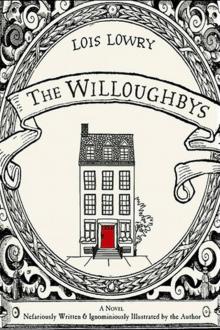 The Willoughbys
The Willoughbys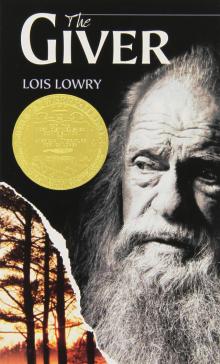 The Giver
The Giver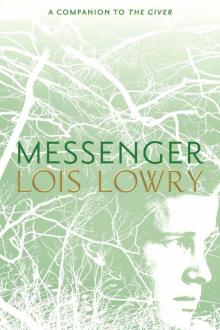 Messenger
Messenger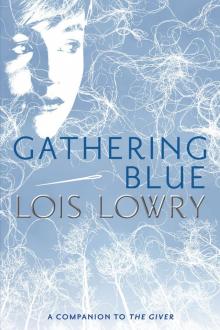 Gathering Blue
Gathering Blue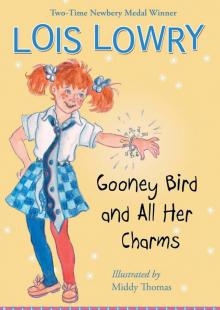 Gooney Bird and All Her Charms
Gooney Bird and All Her Charms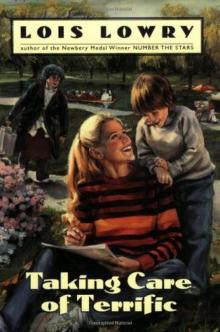 Taking Care of Terrific
Taking Care of Terrific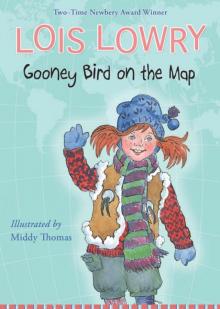 Gooney Bird on the Map
Gooney Bird on the Map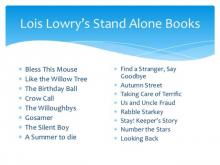 The Birthday Ball
The Birthday Ball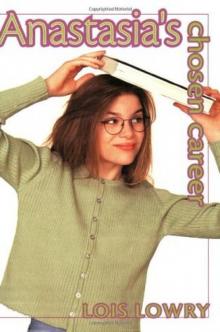 Anastasia's Chosen Career
Anastasia's Chosen Career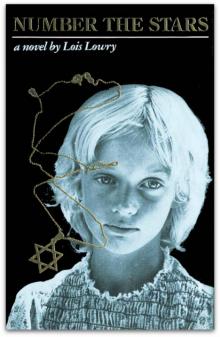 Number the Stars
Number the Stars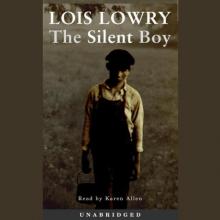 The Silent Boy
The Silent Boy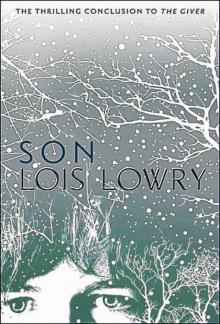 Son
Son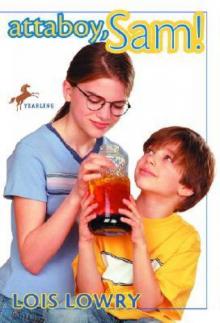 Attaboy, Sam!
Attaboy, Sam!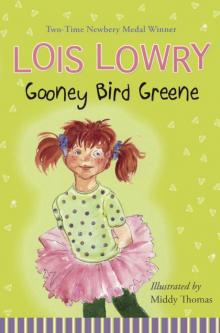 Gooney Bird Greene
Gooney Bird Greene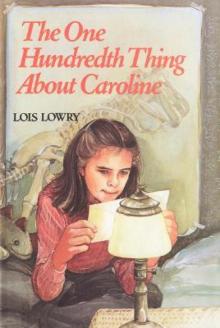 The One Hundredth Thing About Caroline
The One Hundredth Thing About Caroline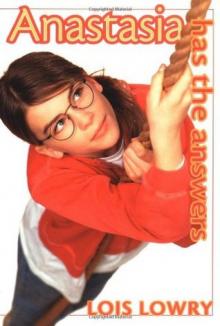 Anastasia Has the Answers
Anastasia Has the Answers Your Move, J. P.!
Your Move, J. P.!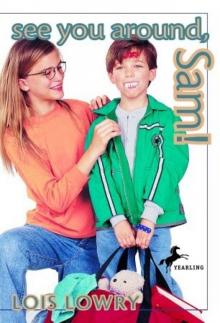 See You Around, Sam!
See You Around, Sam!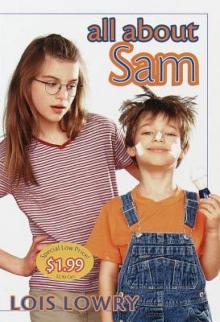 All About Sam
All About Sam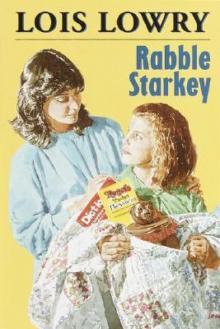 Rabble Starkey
Rabble Starkey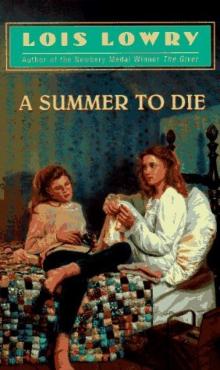 A Summer to Die
A Summer to Die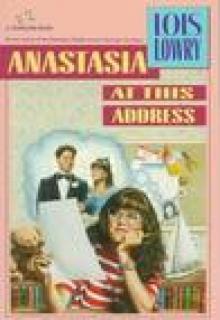 Anastasia at This Address
Anastasia at This Address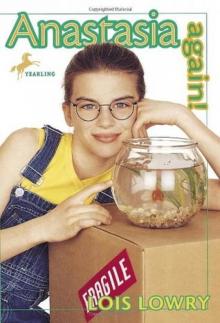 Anastasia Again!
Anastasia Again!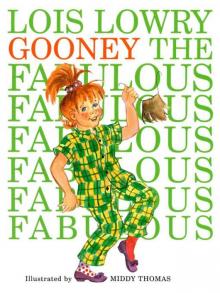 Gooney the Fabulous
Gooney the Fabulous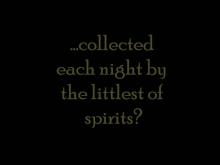 Gossamer
Gossamer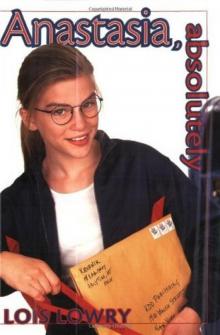 Anastasia, Absolutely
Anastasia, Absolutely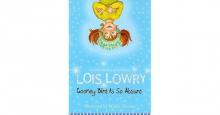 Gooney Bird Is So Absurd
Gooney Bird Is So Absurd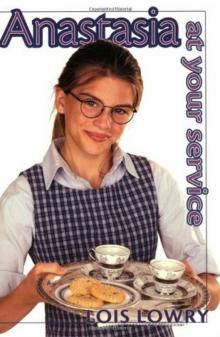 Anastasia at Your Service
Anastasia at Your Service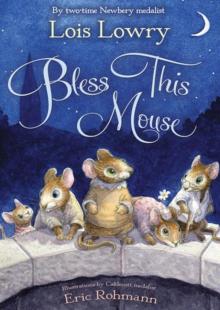 Bless this Mouse
Bless this Mouse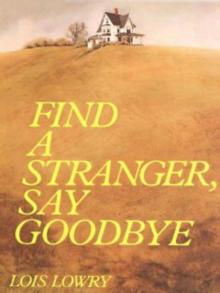 Find a Stranger, Say Goodbye
Find a Stranger, Say Goodbye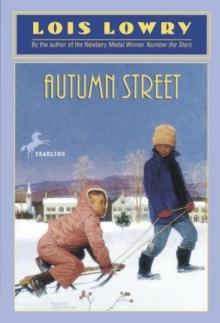 Autumn Street
Autumn Street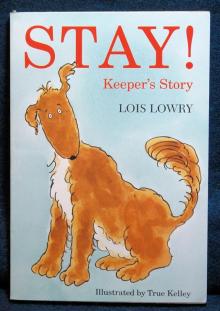 Stay Keepers Story
Stay Keepers Story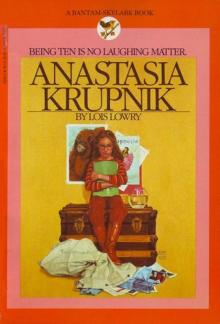 Anastasia Krupnik
Anastasia Krupnik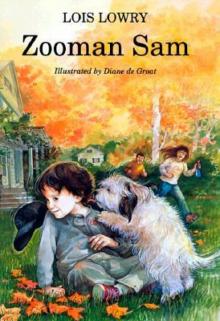 Zooman Sam
Zooman Sam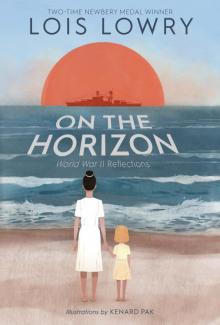 On the Horizon
On the Horizon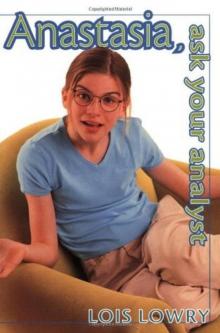 Anastasia, Ask Your Analyst
Anastasia, Ask Your Analyst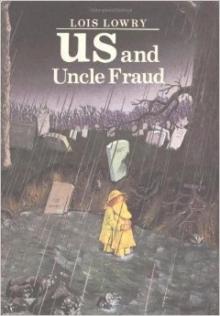 Us and Uncle Fraud
Us and Uncle Fraud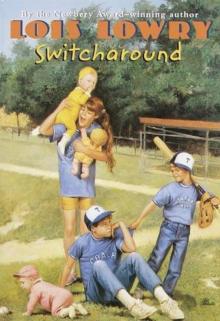 Switcharound
Switcharound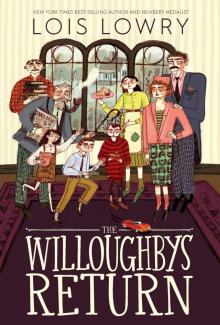 The Willoughbys Return
The Willoughbys Return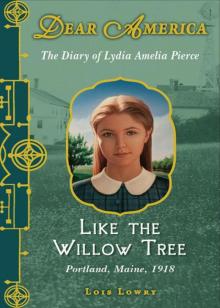 Dear America: Like the Willow Tree
Dear America: Like the Willow Tree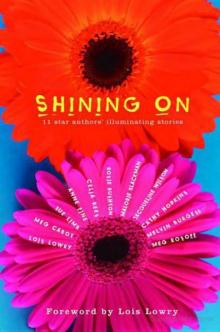 Shining On
Shining On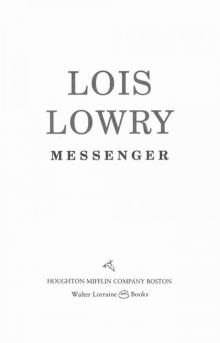 Messenger (The Giver Trilogy)
Messenger (The Giver Trilogy)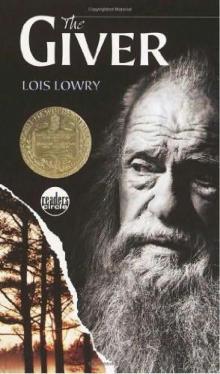 Giver Trilogy 01 - The Giver
Giver Trilogy 01 - The Giver